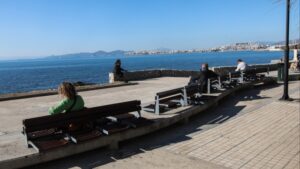These days are significant for New Democracy (ND), as they celebrated their 50th anniversary with joy and festivities, though not without some complaints. After all, Mitsotakis has a Cabinet of around 60 members, and it’s not possible to have 150 so that everyone is happy. At the same time, PASOK is also marking its 50th anniversary, and it currently finds itself in what could be described as the first half of the most critical match in its history.
Given that we’ve mentioned PASOK numerous times over the past weeks — understandably so — if one were to summarize the current situation in a few words, he could say to the citizens: “If you want there to be an opposition, go and vote on Sunday.” It’s that simple, and based on common sense.
It’s a fact that since 1974, when the new political landscape of the post-junta era was formed, there have been around 12 to 16 months where a government didn’t face any real opposition. This was the case for Tsipras from January 2015 until mid-2016, when Mitsotakis appeared as the leader of ND and quickly overtook him in the polls by a steady margin of 8–10 points. Tsipras, therefore, knew what was coming — he felt the opposition breathing down his neck, despite having time, money from oligarchs eager to control a new government, and support from some figures within ND (Karamanlis, Pavlopoulos, etc.).
Today, especially after the 2023 national elections, Mitsotakis faces virtually no opposition. This is evident from two facts. First, the electoral results themselves: in the 2024 European elections, ND’s total decline was roughly equal to the combined totals of PASOK and SYRIZA. So, in a period of relaxed voting in European elections, with three more years of secured governance ahead, if people aren’t even voting for PASOK or SYRIZA as a form of protest, it means neither Androulakis nor Kasselakis resonate with the public as leaders of an opposition.
The second fact is that more attention (even noise) is generated by the questions posed by ND MPs about issues like non-performing loans or pharmaceuticals than by the opposition itself. It’s not wrong for ruling party MPs to ask questions, but they likely do so to attract the attention of the leader, hoping that in the next reshuffle, the number of non-parliamentary ministers (most of whom haven’t exactly been “stars”) will be reduced from 19 to fewer.
So, if someone believes that this objective reality — the lack of opposition — isn’t helping anyone, not even the government itself, and much less the “checks and balances” of democracy, as the British say, then whether they are PASOK supporters or not, they might consider voting on Sunday. Of course, unless they fully disagree with the party’s ideological foundations. But let’s not forget that over the past 50 years, PASOK has contributed serious political figures and significant national policies to the country, such as entry into the Economic and Monetary Union, the adoption of the Euro, etc.
I honestly don’t know if today’s PASOK can serve as a counterbalance to the other major party of the post-junta era, or if it’s simply a “relic of the past” that has run its course but no one acknowledges it, or we don’t want to accept that it’s no longer relevant. It could be the case.
However, this might be an opportunity to find out, both this Sunday and next, depending on the results. So, anyone who wants to actively participate in this should go and vote.
Ask me anything
Explore related questions





